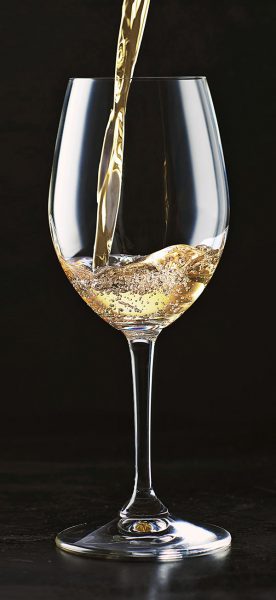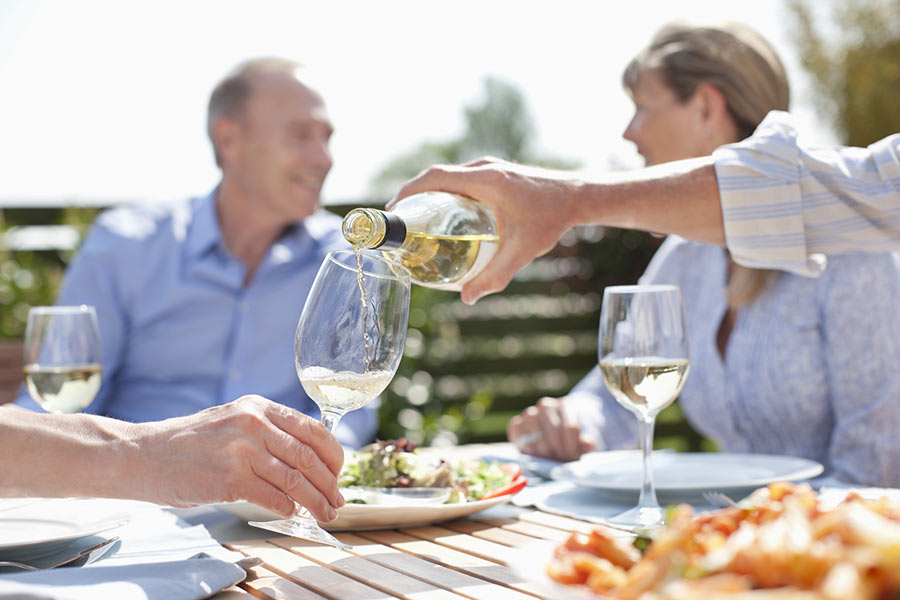By Jen Singer
Recent studies have suggested some surprising things (not beaming from the center of our solar system) that might increase your risk for skin cancer. We delved into the research on several of these, which we will share in a series of articles here. The first looks at drinking white wine and whether you should be concerned — or not. PS: Don’t panic!
But First, a Reminder
It’s important to remind you that medical research is a tricky thing. Some gold standard clinical trials can prove cause and effect between a substance or behavior and a health risk (as with smoking and lung cancer, for example). Other studies, however, may reveal an association between a behavior and a health risk but not causality. Those are not so easy to interpret, and sometimes they even garner overhyped coverage in the media.
It’s helpful, in reading stories like this one, to know the difference between the terms “absolute risk” and “relative risk,” so you don’t mistake one for the other. Your absolute risk is the chance of developing a condition over a time period, such as your lifetime. Relative risk, on the other hand, is the chance of one group of people who have a certain characteristic (say, those who eat chocolate every day) developing a condition versus a group who never eat chocolate. Let’s say 8 in 100 chocolate eaters develop a disease. That’s an absolute risk of 8 percent. If a careful study found that eating no chocolate reduced the relative risk of that disease by 50 percent, that means 4 of 100 no-chocolate eaters would develop it, reducing the absolute risk in that group from 8 percent to 4 percent.
When thinking about your risk for skin cancer, it’s important to remember that most skin cancers are caused by ultraviolet (UV) radiation from the sun. But a host of other things besides the sun may increase your chances of getting skin cancer, too. The most proven include UV light from indoor tanning, family history of skin cancer, previous skin cancers, certain genetic traits, drugs required to suppress the immune system after an organ transplant and exposure to some toxic chemicals.
A few times a year, studies come out that grab headlines for other things that have shown an association with skin cancer. Drinking white wine was one that (understandably) got some coverage in the media.
What Is It About Wine?
Almost everyone likes the headlines when a study is published about the health benefits of wine or chocolate — but not so much when something negative comes out. Related to the risk for skin cancer, at least, you don’t need to worry about the chocolate you love. However, a 2016 study published in Cancer Epidemiology, Biomarkers & Prevention reported an association between alcohol intake — particularly white wine — and a modest increase in the risk of invasive melanoma in white men and women. Melanoma is a dangerous form of skin cancer that can be life-threatening if it’s not diagnosed and treated early. “Invasive” means that the cancer has grown deeper than the outermost layer of the skin.

The researchers reported that drinking a glass of white wine each day carried a 13 percent increased risk, and those who drank the most white wine (greater than 20 grams of ethanol per day) had an increased risk of 50 percent or higher than those who did not drink at all. The relative risk here is a comparison between two groups: white wine drinkers and those who don’t drink any alcohol. If your odds of getting skin cancer were tiny to begin with, increasing that risk by 13 or even 50 percent might not motivate you to change your habits. If your preexisting risk is high, though, it might.
The study authors suggest that a cancer-causing compound called acetaldehyde may be the culprit. This compound is a byproduct of alcohol metabolism, created when the liver breaks down alcohol. And white wine isn’t its only alcoholic source. It surprised the study authors that white wine was the only alcoholic beverage in the study independently associated with increased risk of melanoma, according to an article on the website of the American Association for Cancer Research (which publishes the journal). While the reason is unknown, research has shown that some wines have higher levels of acetaldehyde than beer or spirits. While red and white wine may have similar amounts, the antioxidants in red wine may offset the risks.
The report relied on data from three studies with more than 200,000 participants. More focused research is needed, though, before any major conclusions can be drawn. It’s important to note that The National Cancer Institute cites an association between alcohol and several types of cancer, but melanoma is not among them — at least for now. If you have a family or personal history of melanoma or other skin cancers and are concerned about alcohol, talk to your doctor.
The second in our series on things (besides the sun) that may increase your risk for skin cancer focuses on commonly prescribed medications.
Jen Singer is a health writer based near New York City.
Articles in this series:
Are Your Meds Increasing Your Risk of Skin Cancer?
Can a Medical Condition Increase Your Risk of Skin Cancer?
Can Working as a Firefighter Increase Your Risk of Skin Cancer?





